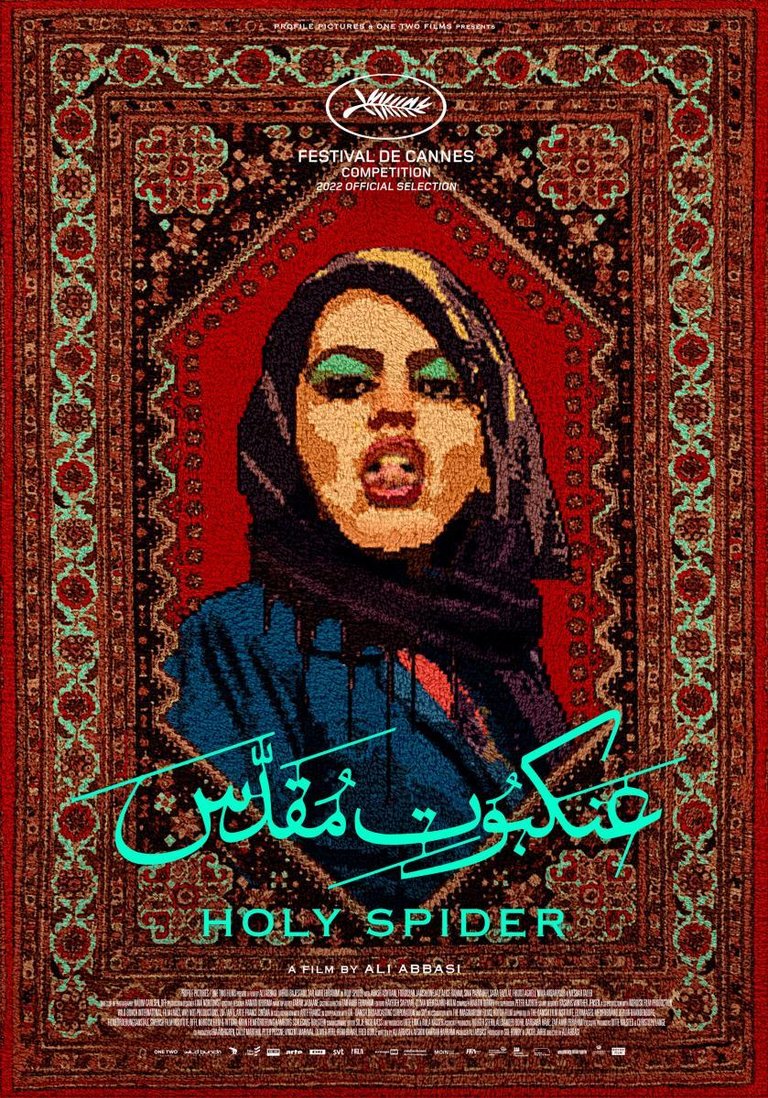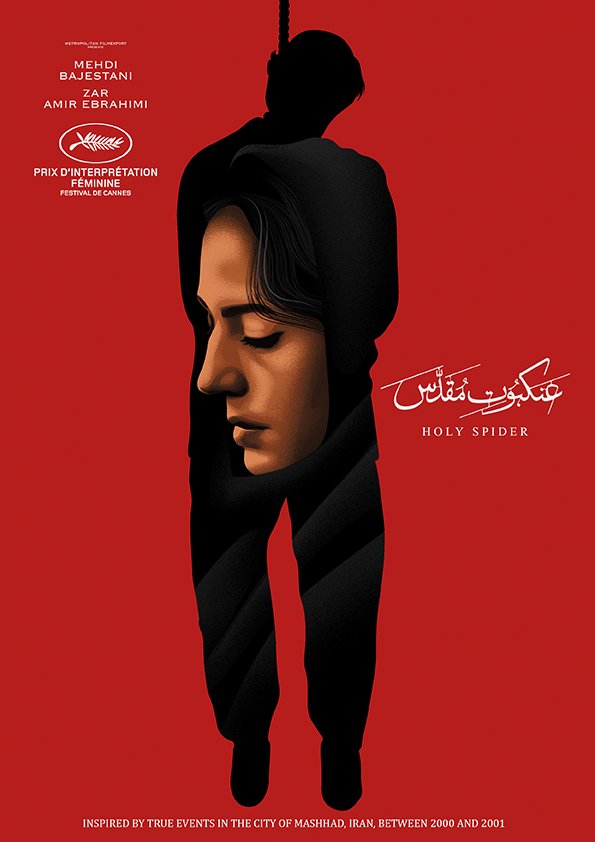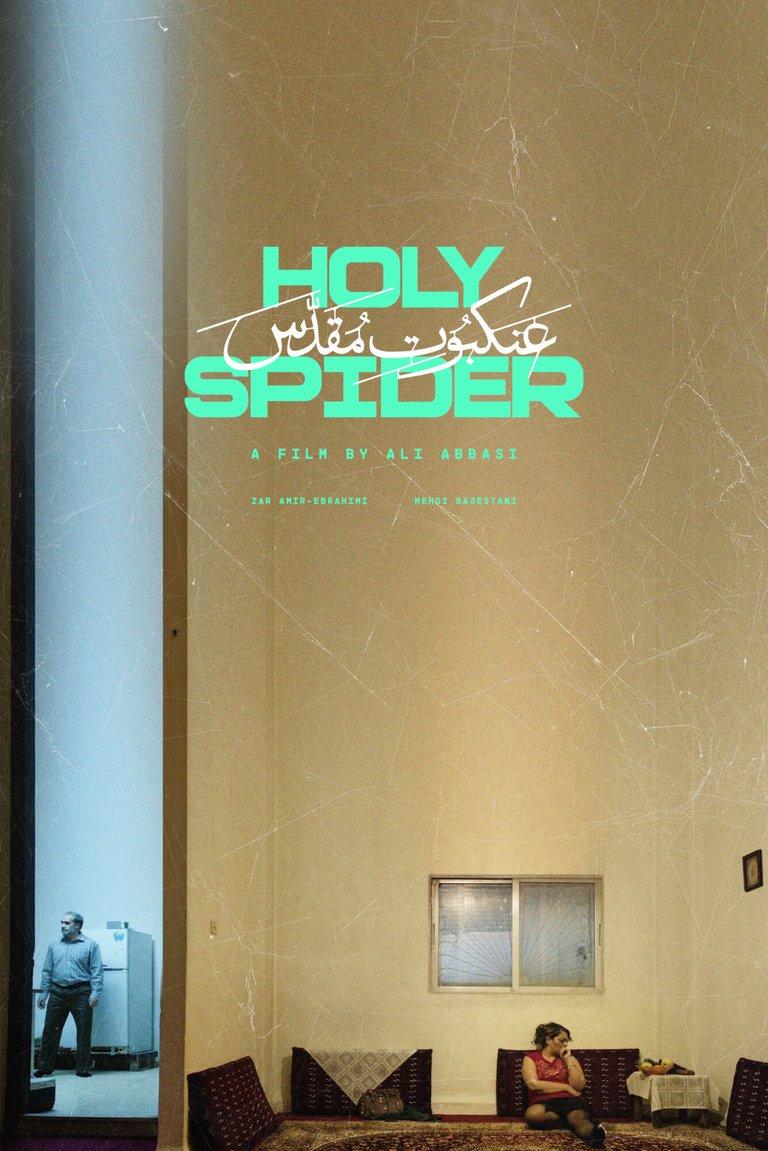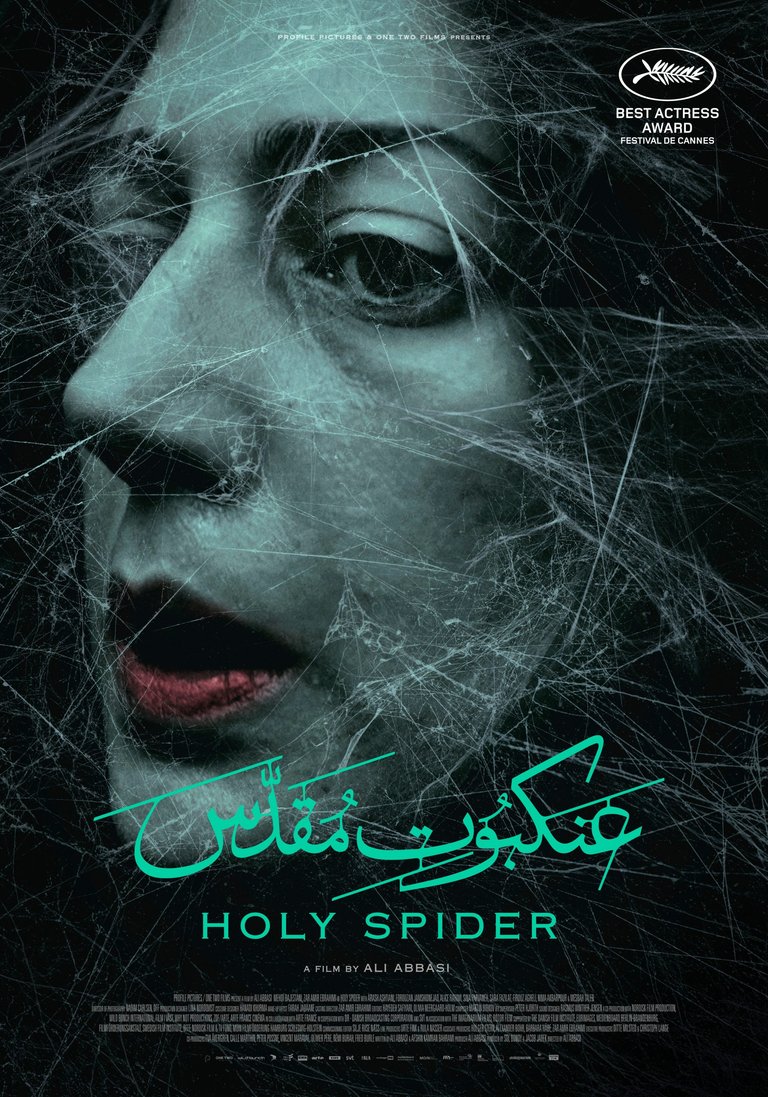Holy Spider (2023): killing in the name of God | matar en nombre de Dios

Although I've previously talked about how wonderful I think the MUBI platform is and how I prefer it over Netflix, Prime Video, Max or any other, the truth is that with each new film I see on the platform, my admiration for it only grows and grows. MUBI's curation, based mainly on European festivals, arthouse cinema and classic names within the industry, is - in my opinion - the most interesting space that a cinephile can find these days.
Si bien antes había hablado de lo maravillosa que me parece la plataforma de MUBI y de mi favoritismo por ella sobre Netflix, Prime Video, Max o cualquier otra, la verdad es que a cada nueva película que veo en la plataforma mi admiración por ella no hace más que crecer y crecer. La curaduría de MUBI, basada principalmente en festivales europeos, cine de autor y nombres clásicos dentro de la industria es - a mi parecer - el espacio más interesante que puede encontrar un cinéfilo en estos días.
After having watched two very good films back to back on MUBI (without using any other platform or attending any cinema screenings in between) and having reviewed them (you’ll find the reviews at the end of this post), I decided to bet again on the To-Watch List I have on that platform to choose something to watch two nights ago and I came across this film that I had my eye on since last year and that had already been reviewed by other expert cinephiles on Hive (I don’t know if I read the review by @jcrodriguez, @wiseagent or @namiks). Holy Spider is a co-production between Denmark, Germany, France and Sweden, but written, acted and directed by Iranian talent and based on real events that occurred in that country at the beginning of this century. The events take place in Mashhad, a holy city in Iran, in 2001. A journalist named Arezoo Rahimi travels from Tehran to cover a story about a serial killer who has been doing his thing in Mashhad for several months. The victims are all women and all were sex workers, which gives the murders a misogynistic tone as well as a social and religious one, considering this is a country like Iran. To investigate what is really going on and why after more than a dozen murders the police still haven't found any leads, Rahimi delves into the most notorious neighborhoods of the city and begins to follow and interview street prostitutes to obtain some information, which will not be easy.
Después de haber visto consecutivamente dos muy buenas películas en MUBI (sin usar otra plataforma ni asistir a funciones de cine entremedio) y de haberlas reseñado (encontrarás las reseñas al final de este post), decidí apostar nuevamente a la Lista de pendientes que tengo en esa plataforma para escoger algo que ver hace dos noches y me encontré con esta película que tenía en la mira desde el año pasado y que ya habían reseñado otros cinéfilos expertos en Hive (no sé si leí la reseña de @jcrodriguez, de @wiseagent o de @namiks). Holy Spider es una co producción entre Dinamarca, Alemania, Francia y Suecia, pero escrita, actuada y dirigida por talento iraní y basada en acontecimientos reales ocurridos en ese país a principios de este siglo. Los hechos trascurren en Mashhad, una ciudad sagrada de Irán, durante el año 2001. Una periodista llamada Arezoo Rahimi viaja desde Teherán para cubrir un reportaje sobre un asesino serial que ha estado haciendo de las suyas en Mashhad desde hace varios meses. Las víctimas son todas mujeres y todas eran trabajadoras sexuales, con lo cual los asesinatos cobran un tinte no sólo misógino sino también social y religioso, tratándose de un país como ese. Para investigar qué es lo que realmente está pasando y cómo es que después de más de una decena de asesinatos la policía aún no ha conseguido ninguna pista, Rahimi se sumerge en los barrios con peor reputación de la ciudad y comienza a seguir y a entrevistar a prostitutas callejeras para obtener algo de información, lo cual no será nada fácil.
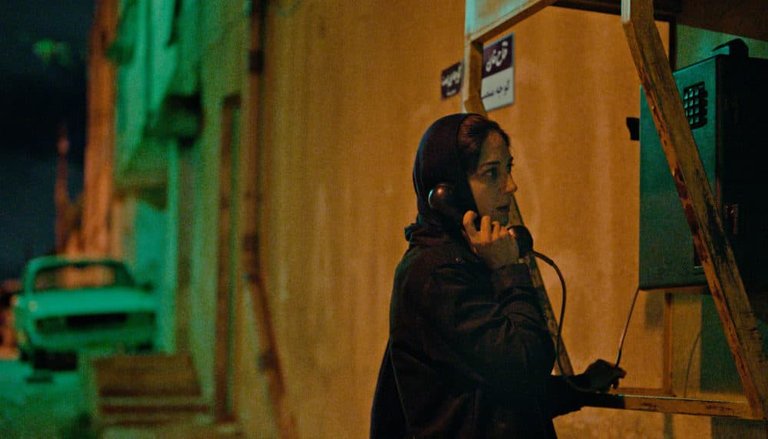
The first thing we notice is the excessive slowness of the local authorities. It's true that solving the case is not an easy task, but both Rahimi and the viewers are surprised that there is no sense of urgency in finding any clue that leads to the identification of the murderer and that distrust gradually turns into suspicion. Is the police involved? Are they turning a blind eye? Or is their inaction tacit support for the murders?
Lo primero que notamos es demasiada lentitud por parte de las autoridades locales. Es cierto que resolver el caso no es una tarea sencilla, pero tanto a Rahimi como a los espectadores les sorprende que no exista un sentido de urgencia por dar con alguna pista que conduzca hasta la identificación del asesino y esa desconfianza poco a poco se transforma en suspicacia, ¿está involucrada la policía? ¿se están haciendo de la vista gorda? ¿o acaso su inacción es una apoyo tácito a los asesinatos?
Two of the things I liked about this film were, first, that the identity of the killer was not a mystery. From the beginning we see him, we know who he is and our concern is whether they will manage to catch him. The second is that the film does not end with the capture of the killer, but tells a little more and that allows us to focus on the social and theological context in which the criminal is being judged. Iran is a deeply religious country and respects its creed, but Islam is a patriarchal structure. We have seen time and time again how in Middle Eastern countries, women's voices are silenced, their faces are covered, their rights annihilated, all with the excuse of a divine will or a religious purpose, but which in essence is nothing more than backwardness and misogyny. Rahimi, the reporter, experiences this discrimination when she realises that, just because she is a woman, simple tasks such as renting a hotel room are made more difficult for her, or she realises that because of her gender the police or the people she interviews don't tell her all the things that they do tell their male counterparts. Not to mention how ordinary people begin to support the murderer, claiming that what he does is a form of social cleansing because prostitutes attack morality and live in sin. What's more, many of the murderer's followers believe that they are sin itself and that killing them is both a social service and a holy war that should not only not be condemned but should be rewarded. For some, the murderer is a hero.
Dos de las cosas que me gustaron de esta película fueron, primero, que la identidad del asesino no fuese un misterio. Desde el inicio lo vemos, sabemos quién es y nuestra inquietud es si lograrán atraparlo. Lo segundo es que la película no termina con la captura del asesino, sino que cuenta un poco más y eso permite poner el foco en el contexto social y teológico en el que está siendo juzgado el criminal. Irán es muy país profundamente religioso y respetuoso de su credo, pero el Islam es una estructura patriarcal. Una y mil veces hemos visto cómo en los países de Oriente Medio, las voces de las mujeres son silenciadas, sus rostros son cubiertos, sus derechos aniquilados, todo con la excusa de una voluntad divina o de un propósito religioso, pero que en el fondo no es más que atraso y misoginia. Rahimi, la reportera, vive esta discriminación cuando se da cuenta de que, sólo por ser mujer, se le hacen más difíciles las tareas tan sencillas como rentar una habitación de hotel, o se da cuenta de que por su género la policía o los entrevistados no le cuentan todas las cosas que sí le cuentan a sus pares masculinos. Ni que decir de cómo la gente común comienza a apoyar al asesino, alegando que lo que hace se trata de una limpieza social porque las prostitutas atacan la moralidad y viven en pecado. Es más, muchos de los seguidores del asesino creen que ellas son el pecado mismo y que asesinarlas es a la vez un servicio social y una guerra santa que no sólo no debe condenarse sino que hay que recompensar. Para algunos, el femicida es un héroe.

But aren't prostitutes, before being sex workers, women and above all human beings? Shouldn't being forced to prostitute themselves out of necessity, out of hunger, be a warning for the authorities responsible for the common good? Isn't it necessary, for prostitution to be practiced, that there also exist consumers of sexual vice? Why not target them? Why not attack those who seek the company of a prostitute? Aren't they as guilty, or more so, than the prostitutes themselves? If they don't do something about it, it's because they don't see it: it's easier to attack women who sell themselves on the street and consider them the incarnation of sin. Something alien to one's own being. They are the sin, not us.
Pero, ¿no son las prostitutas, antes que comerciantes sexuales, mujeres y sobre todo seres humanos? ¿verse obligado a prostituirse por necesidad, por hambre, no debería ser una alerta para las autoridades responsables del bienestar común? ¿no se necesita, para que se ejerza la prostitución, que existan también consumidores del vicio sexual? ¿por qué no apuntar hacia ellos? ¿por qué no atacar a quienes buscan la compañía de una prostituta? ¿no son ellos tanto o más culpables que las propias meretrices? Si no hacen algo en ese sentido es porque no lo ven: es más fácil atacar a las mujeres que se venden en la calle y considerarlas la encarnación del pecado. Algo ajeno al propio ser. El pecado son ellas, no nosotros.
This climate of misogyny is felt throughout the entire film and it's very sad that these types of societies still exist today, where women are trampled, humiliated or abused, inside and outside their home, physically, morally, verbally or professionally. Holy Spider is a thriller, a legal drama, a chilling story based on real events, but it's also a moral, social and religious denunciation of theocratic regimes and patriarchal societies that rely on religion or other things to subdue minorities. The structure of the film complies with what is typical of the police genre, the script is well written and the narrative rhythm is also very well balanced, with moments of anguish, sadness, persecution, defeat, calm, suspicion and other emotions. In today's world there is a great demand for stories based on real events and also on serial killers (why do viewers like them so much?) and Holy Spider fulfills both categories, providing a tone of distinction compared to other serial killer classics and for that reason I recommend it to thriller fans, but also to fans of foreign cinema. To date, a documentary and two films have been filmed based on the case of Saeed Hanaei, who between 2000 and 2001 murdered 16 women in Mashhad, Holy Spider being the most recent, have any of you seen it? I'll read you in the comments.
Ese clima de misoginia se siente a lo largo de toda la película y es muy triste que aún existan este tipo de sociedades en la actualidad, en donde se pisotea, se humilla o se abusa de la mujer, dentro y fuera de casa, física, moral, verbal o profesionalmente. Holy Spider es un thriller, un drama judicial, una espeluznante historia basada en hechos reales, pero también es una denuncia moral, social y religiosa a los regímenes teocráticos y a las sociedades patriarcales que se apoyan en la religión o en otras cosas para doblegar a las minorías. La estructura de la película cumple con lo propio del género policíaco, el guión está bien escrito y el ritmo narrativo está también muy bien equilibrado, con momentos de angustia, tristeza, persecución, derrota, calma, suspicacia y otras emociones. En el mundo de hoy existe gran demanda por historias basadas en hechos reales y también por asesinos seriales (¿por qué gustan tanto a los espectadores?) y Holy Spider cumple con ambas categorías aportando un tono de distinción frente a otros clásicos de asesinos en serie y por esa razón la recomiendo a los fanáticos del thriller, pero también a los fanáticos del cine extranjero. A la fecha, se han filmado un doumental y dos películas basadas en el caso de Saeed Hanaei, quien entre el año 2000 y el 2001 asesinó a 16 mujeres en Mashhad, siendo Holy Spider la más reciente, ¿alguno de ustedes la ha visto? Los leo en los comentarios.
Reseñado por @cristiancaicedo
Other posts that may interest you | Otros posts que pueden interesarte:
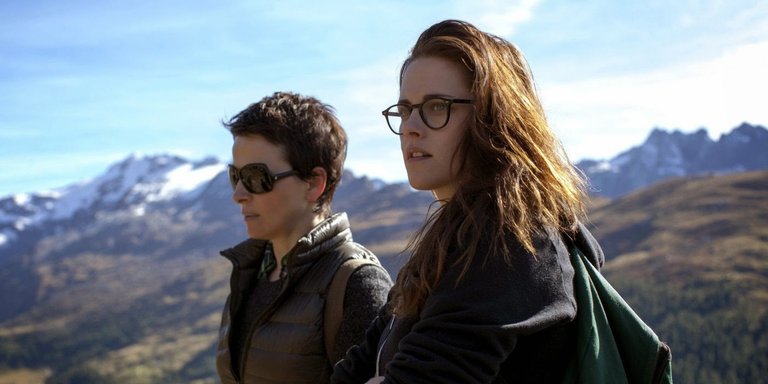  |
|---|
